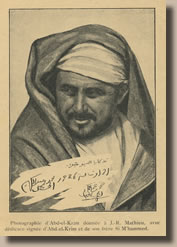The story of how Emir (i.e. Prince) Abdelkrim El-Khattabi
41was spirited out of French captivity has been told in several Arabic and French
42books in different scenarios, each with a variety of details. The “stardom” of who was behind it all has been attributed by or to a number of people. However, none of the “stars”, story-tellers, or authors ever produced the sources of the story save in one book and two Arabic newspaper articles. The book is “
Zalam El Segn” published by Mohamed Ali Eltaher in Cairo in 1951, and the newspapers are “
Al-Hayat”, published in London on March 5, 1995, and “
Asharq Al-Awsat”, also published in London on 11 and 12 July 1993. “
Al-Hayat” had also published the story of Abdelkrim written by Eltaher himself in its June 7, 1962 issue when the paper was still published in Beirut.
The story is reproduced with documentary evidence hereafter essentially as told by Eltaher in his books “Khamsouna Aaman fil Qadaya Al-Arabeyya” pages 804 to 808 and “Zalam El-Segn” pages 871 to 874; and as told in the above-mentioned newspaper articles, as well as in the autobiography of Karim Thabet Pasha, press Counsellor to King Farouk of Egypt, who knew Eltaher quite well43.
|
Abdelkrim at the time of his capture
in 1926 |
"Abdelkrim was born in the Rif regions of northern Morocco along the Mediterranean in 1881. His family hails from the Ouriaghl Berber tribes. During his early youth he fought Spanish colonial occupation of northern Morocco, while the Moroccan nationalist movement was fighting for the independence of the rest of the country from French colonialism."
“The battle of Anoual in 1921 between Abdelkrim’s forces and those of General Manuel Fernandes Sylvestre, commander of the Spanish colonial forces, was the decisive battle in which Abdelkrim defeated his enemy, killing hundreds of soldiers and taking others as prisoners of war. Afterwards Abdelkrim pushed his area of operations towards central Morocco. This raised the alarm among both the French and the Spaniards who felt the incoming danger. So France decided to send troops to support the Spaniards, and it was eventually successful in taking Abdelkrim as prisoner. France then exiled him and most members of his extended
family in 1926 to the island of La Réunion in the Indian Ocean, where they remained until 1947”44
The circumstances of his capture have affected the course of Morocco’s modern history, especially after he had declared the northern part of Morocco a republic. At that time the other parts of the country were under French occupation, even though these parts were under the nominal rule of the Alaoui dynasty to which the current King Mohamed VI belongs.
In Cairo, Eltaher maintained contact with the nationalist movement in the Maghreb countries Libya, Tunisia, Algeria and Morocco since the 1920s. He had also maintained a strong friendship and camaraderie with leaders of the liberation movements in these countries, including Abdelkrim, even though the two men had never met before. Eltaher used to print ongoing news about the Rif revolution as well as the overall Moroccan liberation movement in his newspaper and in the books he published.
On May 23, 1947 Eltaher received a telegram from Abdo Hussein Eladhal, a well-known public figure from the town of Sheikh Osman near Aden, now in Yemen. In his telegram Eladhal said: “Amir Mohamed Abdulkarim Alkhattabi left Aden on 23/5/47 S/S Katoomba.
Signed: Eladhal”.
That telegram is reproduced hereunder as received by Eltaher.

